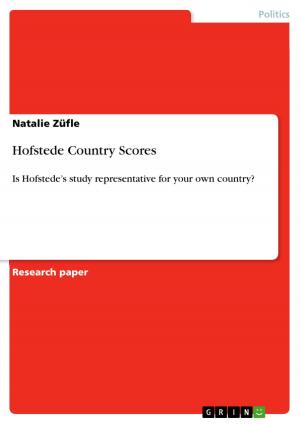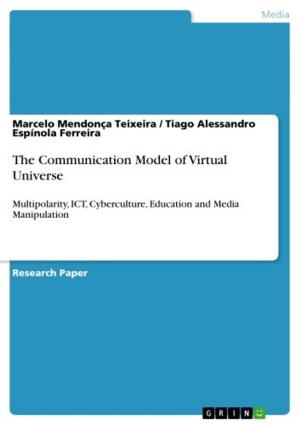Analysis of financial barriers to indigenous enterprise formation on the Copperbelt Province
Business & Finance| Author: | Gift Harris Nachibanga | ISBN: | 9783656836117 |
| Publisher: | GRIN Verlag | Publication: | November 11, 2014 |
| Imprint: | GRIN Verlag | Language: | English |
| Author: | Gift Harris Nachibanga |
| ISBN: | 9783656836117 |
| Publisher: | GRIN Verlag |
| Publication: | November 11, 2014 |
| Imprint: | GRIN Verlag |
| Language: | English |
Master's Thesis from the year 2014 in the subject Business economics - Miscellaneous, grade: Pass, , course: Entrepreneurship, language: English, abstract: The Micro, Small and Medium Sized Enterprises (MSMEs) are the backbone engine for the economic development of any nation. They contribute to the reduction of poverty through creation employment. They actively contribute to the Gross Domestic Product (GDP) and similarly to the Gross National Product (GNP). The MSMEs of today are the large multinational corporations of tomorrow. These are the corporations which will inevitably outlive their founders for generations to come. In order for them to fulfil the above effectively, they require financial support. Therefore, there is need to establish schemes which will narrow the financial barriers that suffocate indigenous enterprise formation. This is the focus of this document. For purposes of data collection leading to the answering of the research questions, this study used cluster sampling in which it divided its target population of 200 into four clusters namely: A (Commercial Banks); B (Non-Bank Institutions); C (Government Agencies); and D (Indigenous SMEs) MSMEs on the Copperbelt Province in the Republic of Zambia have continued to express dissatisfaction about lack or inadequate of financial support from government and financial lending institutions as much as funding of entrepreneurial activities is concern. It is for this reason that this study aimed at establishing the financial barriers that impede SMEs from accessing funds for enterprise formation and the make recommendations on how these barriers could be bridged. The results obtained demonstrated that MSMEs failed to get financial assistance due to among other financial barriers; the lack of information on financing options; the failure of MSMEs to formalise their businesses; lack of proper financial statements demanded for by the lending institutions; lack of appropriate and adequate collateral; the high cost of borrowing; the intensity of documentation when attempting to access finance; finacial indiscipline and poor credit history; and the negative image that lenders have about entrepreneurs. These are barriers to access of finance by entrepreneurs that are desirous of either starting up enterprises or growing their already existing ones. Central to the successful access of finance by SMEs was financial literacy and availability of information on the services and products that financials institutions and government agencies such as CEEC offer. [...]
Fondly known as Chipo, I was born in 1984 in Haambala a hamlet in Nachibanga, Choma District in Southern Zambia. My parents being both educationists, moved from school to school in their working life, and hence I did my primary education at various schools in Zambia namely Kacheta Primary School in Lusaka; Chabota Basics School in Mumbwa; St. Columbus School in Kabwe; Katondo Primary in Kabwe; and Nakatete Primary School in Kafue. I received my Secondary Education at Malundu School (where I became vice headboy) in Kafue and was the best graduating student of 2001. My most striking and indelible experience at primary school was my encounter with teacher Moffat Chibwe who always found time to talk about careers during or after lessons. Who kept reminding me that I could be whoever I wanted to be in future with the correct education. The School anthem at Malundu School titled "A will a way" left a positive and indelible impact on my life. Soon after Secondary School, I worked as a lawn and flower tender at a motel and then as a storekeeper in Kafue, Zambia. My first tertiary education experience was at Kitwe School of Nursing on the Copperbelt Province. Whilst here, I got a job with the Government of the Republic of Zambia as a Junior Executive in one of the security wings. I worked there for 9 years. My second and third tertiary education encounters were with the University of Zambia. Here I obtained Certificates in Law and the other in Human Resource Management. I later enrolled at the Copperbelt University (CBU) in Kitwe and earned a Bachelor of Arts Degree in Human Resource Management in 2010. In years 2012 to 2014 I went to CBU where I earned myself a generic Master of Business Administration degree. I am currently a Human Resources Advisor at one of the copper mining giants in Zambia called Mopani Copper Mines on the Copperbelt Province. My next move academically is to pursue a Doctoral Degree in Business Administration (DBA).
Master's Thesis from the year 2014 in the subject Business economics - Miscellaneous, grade: Pass, , course: Entrepreneurship, language: English, abstract: The Micro, Small and Medium Sized Enterprises (MSMEs) are the backbone engine for the economic development of any nation. They contribute to the reduction of poverty through creation employment. They actively contribute to the Gross Domestic Product (GDP) and similarly to the Gross National Product (GNP). The MSMEs of today are the large multinational corporations of tomorrow. These are the corporations which will inevitably outlive their founders for generations to come. In order for them to fulfil the above effectively, they require financial support. Therefore, there is need to establish schemes which will narrow the financial barriers that suffocate indigenous enterprise formation. This is the focus of this document. For purposes of data collection leading to the answering of the research questions, this study used cluster sampling in which it divided its target population of 200 into four clusters namely: A (Commercial Banks); B (Non-Bank Institutions); C (Government Agencies); and D (Indigenous SMEs) MSMEs on the Copperbelt Province in the Republic of Zambia have continued to express dissatisfaction about lack or inadequate of financial support from government and financial lending institutions as much as funding of entrepreneurial activities is concern. It is for this reason that this study aimed at establishing the financial barriers that impede SMEs from accessing funds for enterprise formation and the make recommendations on how these barriers could be bridged. The results obtained demonstrated that MSMEs failed to get financial assistance due to among other financial barriers; the lack of information on financing options; the failure of MSMEs to formalise their businesses; lack of proper financial statements demanded for by the lending institutions; lack of appropriate and adequate collateral; the high cost of borrowing; the intensity of documentation when attempting to access finance; finacial indiscipline and poor credit history; and the negative image that lenders have about entrepreneurs. These are barriers to access of finance by entrepreneurs that are desirous of either starting up enterprises or growing their already existing ones. Central to the successful access of finance by SMEs was financial literacy and availability of information on the services and products that financials institutions and government agencies such as CEEC offer. [...]
Fondly known as Chipo, I was born in 1984 in Haambala a hamlet in Nachibanga, Choma District in Southern Zambia. My parents being both educationists, moved from school to school in their working life, and hence I did my primary education at various schools in Zambia namely Kacheta Primary School in Lusaka; Chabota Basics School in Mumbwa; St. Columbus School in Kabwe; Katondo Primary in Kabwe; and Nakatete Primary School in Kafue. I received my Secondary Education at Malundu School (where I became vice headboy) in Kafue and was the best graduating student of 2001. My most striking and indelible experience at primary school was my encounter with teacher Moffat Chibwe who always found time to talk about careers during or after lessons. Who kept reminding me that I could be whoever I wanted to be in future with the correct education. The School anthem at Malundu School titled "A will a way" left a positive and indelible impact on my life. Soon after Secondary School, I worked as a lawn and flower tender at a motel and then as a storekeeper in Kafue, Zambia. My first tertiary education experience was at Kitwe School of Nursing on the Copperbelt Province. Whilst here, I got a job with the Government of the Republic of Zambia as a Junior Executive in one of the security wings. I worked there for 9 years. My second and third tertiary education encounters were with the University of Zambia. Here I obtained Certificates in Law and the other in Human Resource Management. I later enrolled at the Copperbelt University (CBU) in Kitwe and earned a Bachelor of Arts Degree in Human Resource Management in 2010. In years 2012 to 2014 I went to CBU where I earned myself a generic Master of Business Administration degree. I am currently a Human Resources Advisor at one of the copper mining giants in Zambia called Mopani Copper Mines on the Copperbelt Province. My next move academically is to pursue a Doctoral Degree in Business Administration (DBA).















